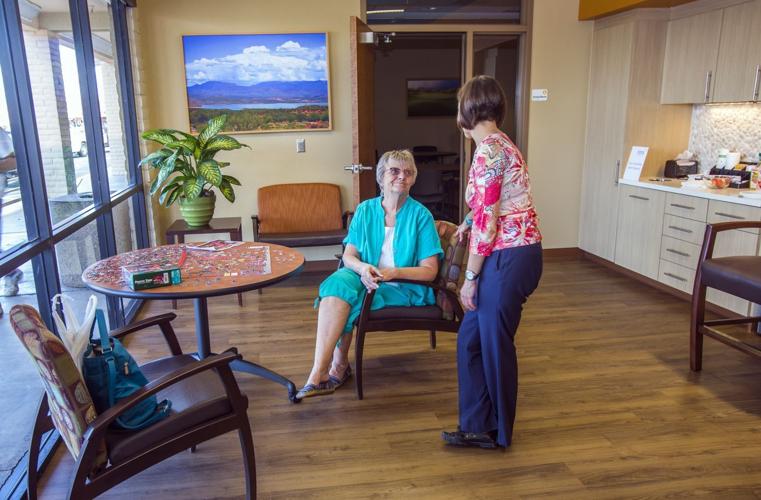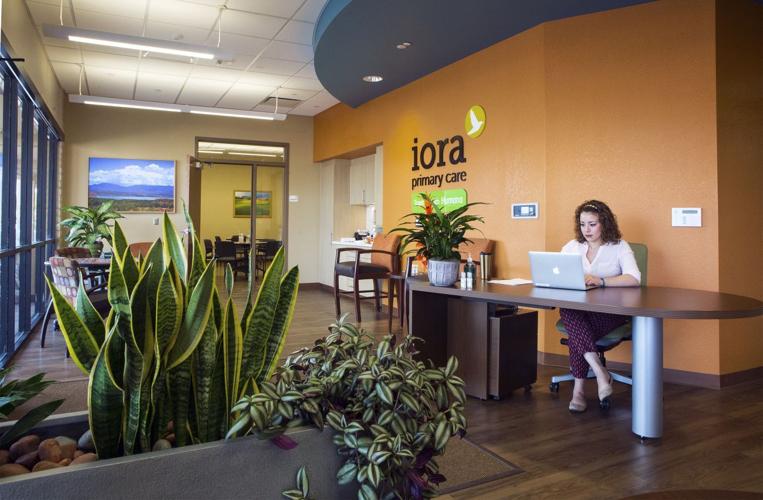At 77, Betty Johnson has shed her walker, stopped smoking and wants to start writing poetry again.
The former bar owner and businesswoman credits her doctor and health coach at an Iora Primary Care clinic in Phoenix, where she’s been getting care for the past year.
She goes to the clinic for weekly exercise classes and regularly talks to her health coach, Liz, about how she’s doing mentally and physically. She’s even made friends there — on her birthday, the clinic gave her a cake and a card signed by staff and fellow patients.
Iora, which began in Boston three years ago, just opened two clinics in Tucson as part of an expanding presence in Arizona.
The company’s strategy, one it says sets it apart from other medical innovators, is a model of primary care that throws out the old system of billing per procedure and instead focuses on patient outcomes.
Iora’s co-founder, Dr. Rushika Fernandopulle, has received national recognition for his ideas about reforming the health system from one that rewards specialists for taking care of sick people to one that rewards providers who prevent people from getting sick in the first place.
Earlier this month, Forbes magazine named Iora one of seven organizations that “will turn health care upside down in 2016.”
One of Iora’s buzzwords is “humanity,” and it’s a word the company takes seriously. Each clinic has a team of health coaches hired for their empathy.
Those coaches are key to the Iora model — they keep in regular contact with patients via email, text and phone, including checking up if patients haven’t filled prescriptions, making sure they get required tests, coordinating care with specialists and encouraging patients to participate in clinic activities like exercise class.
“this is about being creative, human”
The idea of focusing on patient outcomes is not new. What is new is the “team-based” primary-care model with health coaches, which Iora created and is now replicating like franchises in multiple markets.
The company began after launching pilot projects for Boeing workers in Seattle and casino workers in Las Vegas. It has clinics in Nevada, New Hampshire, New York, Connecticut, Massachusetts, Colorado, Washington and now Arizona, where it has three in the Phoenix area and two in Tucson.
Iora requires a partner to operate each clinic, and in Arizona that’s Humana, the health insurance company. The Arizona clinics are for people over age 65 who are enrolled in a Humana Medicare Advantage plan.
Humana pays Iora a monthly fee per patient, and Iora makes its money by keeping them well. The opening of the local clinics coincided with Medicare open enrollment, so the clinics expect to have full rosters of local patients beginning Jan. 1.
“What is liberating is we don’t deal with billing codes. Billing is irrelevant,” Fernandopulle, Iora’s CEO and co-founder, said as he walked through the company’s new clinic in the Fry’s strip mall at East Grant Road and North Alvernon Way. Iora’s second Tucson clinic is at East Broadway and Camino Seco, near an Ace Hardware and a Walmart.
“This is about being creative, human and figuring it out,” Fernandopulle.
Cheerful and passionate, Fernandopulle, who named Iora for a bird in his native Sri Lanka, is on the faculty of Harvard Medical School and was the first executive director of the Harvard Interfaculty Program for Health Systems Improvement.
In his view, obstacles to health care are often easily fixable — if someone asks the right questions. At one clinic in Seattle, he said, a health coach checked up on a patient who hadn’t been showing up to appointments. It turned out the woman didn’t understand the public transportation system, so the health coach accompanied her on the route to show her the way.
“It’s still too early in the relationship for measurable data. However, we have already seen promising results on an individual-member basis,” said Rick Beavin, the Arizona Medicare president for Humana. “Every day we hear success stories of patients whose lives are changing and benefiting from the care they are receiving at Iora.”
Humana officials would not say how many people use Iora clinics. As of June 30, the company had 133,800 Medicare Advantage plan members in Arizona.
Greeters instead
of payment windows
The U.S. has the most expensive health system in the world, spending 17.1 percent of its gross domestic product on health care in 2013, a study of 13 high-income countries from the Commonwealth Fund found. That was almost 50 percent more than the next-highest spender, France, which spends 11.6 percent of its gross domestic product on health.
Despite the United States’ high expenditures, life expectancy here is lower than in other high-income countries and infant mortality rates are higher, the same study found. Those statistics are what’s motivating new health models like Iora.
While money is part of the business model at Iora, it’s not obvious to the patient. Fernandopulle doesn’t like the practice of asking patients for money and paperwork the minute they step through the door of a doctor’s office.
Instead of payment windows in the lobby, Iora clinics have “greeters” who make sure patients feel welcome. There’s no need to show identification because Iora clinics know their patients, Fernandopulle said.
There will usually be little or no money exchanged at the Tucson clinics.
Most Humana Medicare Advantage plans in 2016 will have no co-pay to see a primary care physician at Arizona Iora Primary Care clinics, but one plan will have a $5 co-pay, Beavin said.
Each clinic typically develops its own local culture — the Tucson clinics emphasize hiring Spanish speakers, for example, and a Phoenix clinic has brought in a magician.
The consistency is making the patient experience pleasant. There are clinic clubs for walking, and others have been formed around ailments like diabetes or common goals like aging well. An Iora clinic sponsored by Dartmouth College holds a “pappy hour” party with wine and chocolate, where women are encouraged to get Pap smears. A Massachusetts clinic, sponsored by the New England Carpenters Benefits Fund, has “hammer time,” essentially yoga practiced while holding hammers.
“The patient-care model affords us the ability to really put the patient at the center and not focus on the paperwork,” said Dr. Julia Jernberg, the Iora practice medical director in Tucson. “This is unlike any place I’ve ever worked before.”
While putting the patient at the center of a primary practice seems like a no-brainer, it often doesn’t happen. Instead, doctors often have to see too many patients without enough support, Jernberg said.
“You always try to put the patient at the center, but it can be frustrating because the system doesn’t allow us to do that,” she said. “I really like to work with people who are dedicated and passionate and willing to do whatever we need to do to help a patient.”
Morning huddle
The Tucson health coaches include a registered nurse who worked at the UA, a licensed massage therapist with health coach training, a certified nurse assistant and a medic.
They’re hired for their empathy and people skills, so medical training or background is not mandatory.
Each morning, the Iora team has a “huddle” to discuss patients and make plans for them. There’s no hierarchy during these 45-minute sessions — input from doctors, health coaches, a social worker and other staff members is all considered to be of equal importance, Fernandopulle said.
New patients are screened for their “worry” score, which grades their level of sickness. A patient who scores a 10 is in crisis, and should be contacted every day, Fernandopulle said. The aim is for worry scores to go down over time.
Patients are offered same-day and next-day appointments for urgent needs, round-the-clock access to a doctor, home visits when necessary and video and phone access to their care team. Clinic staff workers encourage family members who live out of town to participate in appointments via Skype. Every exam room has a video screen.
satisfaction with life, capabilities increased
Iora worked with Humana to identify locations with a lot of seniors, a lack of primary-care doctors and a high probability of the company making a big impact with its model of care. Both Phoenix and Tucson were on the list from the beginning, said Kathleen Haley, Iora’s vice president of marketing and communications.
“In Tucson, in particular, we’ve seen that access to primary care is hard — long waits, closed panels, doctors moving,” Haley said. “We can help on all accounts while improving outcomes, satisfaction and engagement.”
In a ranking of best to worst rates, Arizona ranks 36th in active primary physicians, the Association of American Medical Colleges says.
The state has 79.2 active primary care doctors per 100,000 people. The highest-ranked state, Massachusetts, has 131.9 active primary physicians per 100,000 people, the association’s most recent data shows.
“Iora’s approach is clearly very patient-centered and team-based, and their business model is driven by health outcomes and not by the number of patients seen in the office each day,” said Dr. Mindy Fain, co-director of the University of Arizona Center on Aging. “However, I don’t know about their day-to-day operations enough to comment more, or whether or not they are financially sustainable in the long run.”
Fain said she has encouraged Iora to build its capacity to make house calls to patients who may not be able to come to the clinic, or when the clinic can no longer provide the care they need. “Otherwise, I think Iora is exploring very important ground in how best to deliver comprehensive primary care, and they have good leadership to guide them,” she said.
In the year since Betty Johnson started going to Iora, the team has helped her reduce the painkillers she’d been taking by more than half, and as a result, she’s feeling more like herself. She is taking fewer prescriptions for her chronic obstructive pulmonary disease, has started driving again, and is having more fun with her appearance, dressing up and trying out a new wig. At the home she shares with her two nieces, she is doing more housework.
“The difference with them is that they have the time to spend with each patient,” she said of Iora. “They show you respect.”







